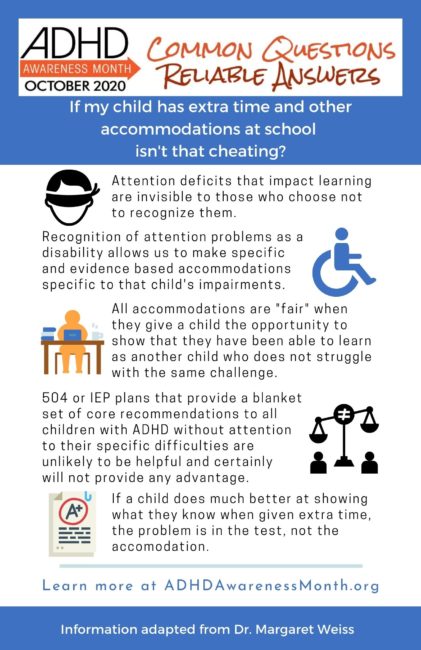If a child is blind, no one considers it cheating to provide them with materials in Braille. If a child is hearing impaired, no one would consider it cheating to provide them with access to learning through signing. The question itself then implies the assumption that ADHD is not a disability. Unlike blindness or deafness, attention deficits that impact learning are invisible to those who choose not to recognize them.
Recognition of attention problems as a disability allows us to make specific and evidence based accommodations specific to that child’s impairments. Note that this does not mean there is one IEP that fits all children with ADHD.
A child with a specific problem with processing speed should be given the time needed to show what they know and have their academic achievement measured by what they can do, and not by the limitations imposed by processing delay.
A child with dysgraphia should be given the opportunity to learn to keyboard, dictate, or have a scribe.
A child who cannot organize should be given the opportunity to have extra books at home, or flexibility with turning in assignments.
A child who cannot work in the evening off stimulant medication, should be given the opportunity to complete work in the classroom, under supervision, and on medication.
All accommodations are “fair” when they allow a child to show that they have been able to learn as another child who does not struggle with the same challenge. 504 or IEP plans that provide a blanket set of core recommendations for all children with ADHD, without attention to their specific difficulties, are unlikely to be helpful. By the same token, however, neither do they provide any advantage. If a child, any child, does much better at showing what they know when given extra time, the problem is in the test, not the accommodation.
About the Author

Margaret D. Weiss, MD, PhD, FRCP(C), is currently the Director of Clinical Research in Child Psychiatry at Cambridge Health Alliance, Cambridge MA. She has specialized in diagnosis, treatment and research in ADHD and other neurodevelopmental disorders in all age groups. She received her MD and Fellowship in Psychiatry from McGill University and her PhD in the History of Science from Harvard University. Dr. Weiss has published over 125 peer-reviewed articles relating to these topics. She is the author of two book chapters on ADHD and coauthored the book ADHD in Adulthood: A Guide to Current Theory, Diagnosis, and Treatment, which is currently under revision. Dr. Weiss is known for her research demonstrating that melatonin is a safe and effective treatment for initial insomnia in ADHD. She is the author of the Weiss Functional Impairment Rating Scale, a widely used measure translated into thirteen languages. She has lectured in more than twenty-one countries. She was the Director of the ADHD Program at Children’s and Women’s Health Centre in British Columbia for 15 years and then was the Director of the Division of Child Psychiatry at University of Arkansas Medical Sciences. She is on the advisory council of the Canadian Attention Deficit Disorder Resource Alliance, and the board of the American Professional Association for ADHD and Related Disorders.
References
- Lovett BJ, Nelson JM. Systematic Review: Educational Accommodations for Children and Adolescents With Attention-Deficit/Hyperactivity Disorder. J Am Acad Child Adolesc Psychiatry. Jul 31 2020.


Accommodations are designed to level the playing field, not lower the bar. Depending on need, accommodations for post-secondary students with ADHD may include such things as priority registration, reduced distraction testing environment, extended time on quizzes/exams, note taking assistance, reduced course load, alternative formats for textbooks (e.g., E Text, Kurzweil, etc.), assistive technology (e.g., speech-to-text programs), and extended time on assignments (that does not fundamentally alter the nature of the curriculum). Post-secondary students should check with their school’s disability department. Formal accommodations in public schools are written into a Section 504 Accommodation Plan or IEP for students in K-12.